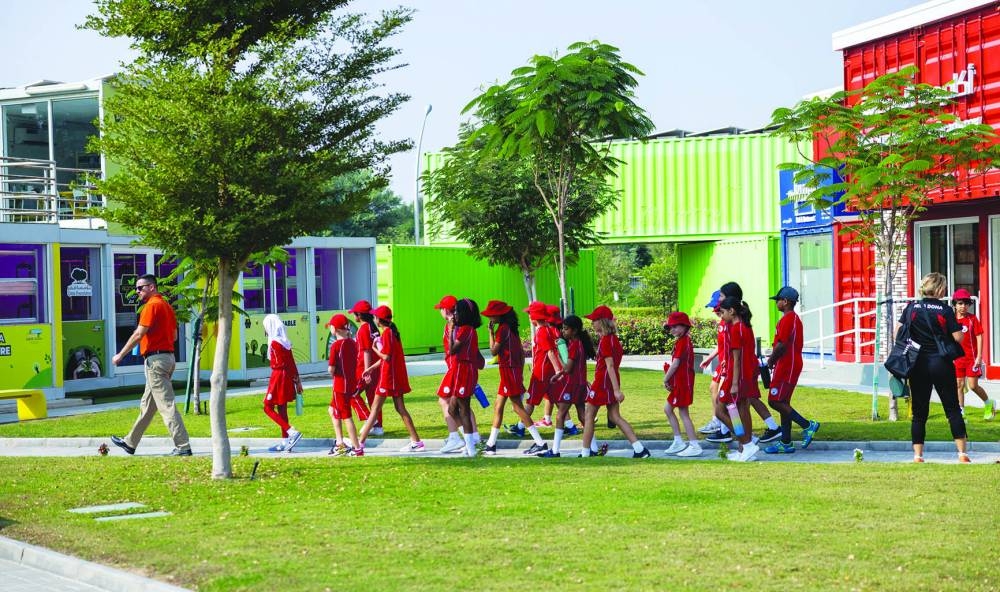
As global efforts intensify to combat climate change, Qatar Foundation continues to lead the charge in embedding sustainability into the nation’s education, research, and community life. In an exclusive interview with *Gulf Times, Dr Nawal Al Sulaiti, Sustainability Manager at Qatar Foundation, discusses how QF is advancing environmental stewardship and shaping a sustainable future for Qatar, one that aligns seamlessly with the Qatar National Vision 2030.

How does Qatar Foundation’s approach to sustainability align with the broader objectives of Qatar National Vision 2030?
Dr Al Sulaiti: Qatar Foundation’s sustainability approach is deeply aligned with the Qatar National Vision 2030, particularly its pillars of environmental development and human development. QF integrates sustainability across its operations, education, and community life, not as a separate goal, but as a way of living and working.

Our initiatives focus on building environmental awareness, reducing carbon footprint, promoting research and innovation, and nurturing a culture of responsibility among the community. In this way, we contribute directly to the national goal of balancing economic growth with environmental preservation for future generations.
Could you highlight some of the key sustainability achievements within Education City that have had a measurable impact?
Dr Al Sulaiti: Education City serves as a living model of sustainable urban development. Some notable achievements include its green building standards, with many buildings across Education City being LEED-certified, demonstrating energy and water efficiency.
In addition, sustainable mobility has been enhanced through the introduction of the Education City Tram, which significantly reduces carbon emissions by providing a clean, electric transportation alternative. This system, the first battery-operated tram charged by pantographs, has already reduced gas emissions by 10% and air pollution by 20%. It serves more than 100,000 passengers a month and has surpassed four million journeys since launch.
Education City has also implemented recycling and waste reduction programs, including waste segregation, composting of organic material, and resource reuse, leading to a measurable decrease in landfill waste. Furthermore, water and energy optimization initiatives, such as smart irrigation systems and renewable energy projects, have reduced consumption across facilities.
Collectively, these efforts demonstrate tangible progress toward a greener campus and community. QF’s sustainability commitment has even earned recognition as a ‘Climate Conscious’ organisation by South Pole, and its carbon-neutral initiatives set a regional benchmark.

What role does innovation play in QF’s efforts to create a more sustainable and environmentally conscious community?
Dr Al Sulaiti: Innovation is at the heart of QF’s sustainability strategy. Through our research institutes, universities, and community programs, we drive innovative solutions to environmental challenges, from water and energy management to sustainable food systems.
For example, partnerships with the Qatar Environment and Energy Research Institute (QEERI) have enabled the piloting of renewable technologies and advanced environmental monitoring systems across Education City. This includes deploying multiple air-quality stations to track gas levels and develop mitigation measures that help reduce CO₂ emissions, particularly in parking areas.
Similarly, community-driven initiatives such as urban farming projects, including QF’s Park and Plant program, aim to densify and beautify Education City while engaging the community in greening efforts, demonstrating how creativity can translate into everyday sustainable practices.
Beyond Education City, QF’s innovation hubs are achieving global impact. Projects such as the Solar Carbon Black Project, developed with Texas A&M University at Qatar and Fraunhofer IWS, are creating clean industrial processes that produce high-grade carbon without greenhouse gas emissions. The Distributed Solar Smart-Grid System, meanwhile, enables real-time monitoring and optimisation of solar energy generation across QF facilities, enhancing efficiency and resilience.

How do initiatives like the micro farms contribute to fostering environmental awareness and community engagement?
Dr Al Sulaiti: The micro farms are a practical example of sustainability in action. They connect students, staff, and the wider community with nature and local food systems. Through hands-on participation, individuals learn about composting, water conservation, and sustainable food production.
These spaces foster environmental awareness, collaboration, and a sense of shared responsibility, inspiring behavioral change by showing that sustainability begins with small, everyday actions that collectively make a big difference.
Teaching students about planting and home composting in the micro farm greenhouse helps them develop practical skills that they can share with their families and friends. Moreover, the outdoor community garden, where families enjoy growing their own vegetables and donating a portion to families in need, nurtures social responsibility, empathy, and community collaboration.
In what ways is QF working to instill sustainability values among students, researchers, and residents within Education City?
Dr Al Sulaiti: QF integrates sustainability into the very fabric of learning and campus life. For students, environmental education is embedded into both curricula and extracurricular activities, nurturing future leaders who value responsible living.
For researchers, QF supports projects addressing local and global sustainability challenges, from energy and water management to biodiversity conservation. For residents, initiatives such as green living workshops, recycling campaigns, and community gardens engage families and residents in sustainable practices.
A key example is Green Island, Qatar’s first and only sustainability education hub. It encompasses all aspects of sustainability, from recycling and upcycling (in partnership with Ashghal), to solar energy (with Qatar Energy), water and energy conservation (with Kahramaa), and hydroponic farming (with Agrico).
This project serves as a national showcase of Qatar’s green efforts and a living example of environmental collaboration in action. It also acts as a catalyst for behavioral change by providing hands-on workshops that empower individuals to adopt sustainable practices in their daily lives.

How does QF collaborate with partners or local organisations to advance sustainability across Qatar?
Dr Al Sulaiti: Collaboration is central to our impact. QF works with government entities, academic institutions, private companies, and community organisations to share expertise and scale sustainability solutions.
Partnerships with the Ministry of Municipality, Ministry of Environment, Ministry of Education, Ehsan, Al Shafallah Center, and others help align national efforts toward sustainable living. Together, we promote best practices in green infrastructure, renewable energy, and environmental education, amplifying QF’s impact beyond Education City.
QF also partners internationally through initiatives like the Earthna Center for a Sustainable Future, which co-developed Qatar’s National Biodiversity Strategy and Action Plan (2025–2035) and restored 40 hectares of mangroves across the country. Earthna’s 2025 Summit brought together over 15,000 participants from 150 countries, reinforcing Qatar’s leadership in sustainability for arid environments.
Looking ahead, what are QF’s main priorities or upcoming projects aimed at reducing environmental impact or promoting green living?
Dr Al Sulaiti: Looking forward, QF is focusing on expanding circular economy initiatives, enhancing renewable energy integration, and promoting sustainable food systems. Upcoming projects include increasing the use of solar energy across facilities, expanding green mobility through electric vehicles and improved cycling infrastructure, and developing new community engagement programs that encourage waste reduction and resource sharing.
Our flagship project, Green Island, exemplifies QF’s circular economy approach. Spanning over 8,000 square meters, it is Qatar’s first community-centric recycling hub and a national model for sustainability education. Built from 95 repurposed shipping containers and partially powered by 100kW of on-site solar energy, it includes six recycling streams, for paper, plastic, aluminum, e-waste, batteries, and organic waste, as well as vertical farms capable of producing 15 tons of vegetables annually for local consumption. It also features research labs, educational exhibits, and a 3D printing lab that uses recycled materials.
Through entities like QEERI, QF continues to pioneer renewable energy solutions, including the Distributed Solar Smart-Grid System that enables real-time solar monitoring and optimisation, and collaborative projects such as the Solar Carbon Black Project, which converts natural gas into high-grade carbon without greenhouse gas emissions.
In parallel, Earthna, QF’s policy and advocacy platform for sustainability, is implementing Qatar’s National Biodiversity Strategy and Action Plan (2025–2035) and leading large-scale restoration of over 40 hectares of mangroves, reinforcing Qatar’s role as a leader in sustainability for hot and arid environments.
Ultimately, QF’s future vision is to build a carbon-neutral, resource-efficient Education City that serves as a living laboratory for sustainable innovation, a model that aligns with Qatar’s ambition to build a sustainable, post-hydrocarbon future.
Credit: Source link













